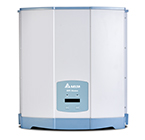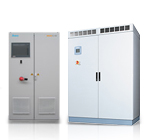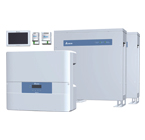The solar inverter is the heart of the PV System. The energy produced by solar panels will be converted into electrical energy (DC), which in turn need to be converted into acceptable form (AC) to run electrical devices.
Being a world leader in Power conversion technology, Delta offers a complete product range of solar inverters, accessories and services to our partners and installers and the best photovoltaic systems to maximize profit.
Delta’s state-of-the-art high frequency topology and MPPT equipped portfolio includes Grid-tied range of RPI series from 3KW to 125KW and DelCEN Series 1 MW to 3 MW. Our inverters are compatible for both crystalline and thin film panels. Delta’s product range aims at catering customers with home, commercial and utility scale inverter requirements.
RPI & DelCEN solar inverters are not only the heart of your system, but also the intelligent control equipment of your power generation in conjunction with the monitoring systems offered by Delta.
Delta’s solar inverters are multifaceted and can be used in every system size as well as are compatible with all commercially available solar modules and system components.
Delta solar inverters come with a standard warranty of 5 years, which can of course be extended to 10 years
Delta is a leading provider of inverter models to consumers that are customized to Indian grid conditions. In addition to their Industry’s high efficiency, our inverters are characterized by a long service life and are easy to install, maintain and monitor. With our well-established local presence and highly motivated and trained Photovoltaic solutions’ team, we will be offering Delta customers fast and reliable local service support in terms of Application Engineering and after sales service.
A solar inverter or PV inverter, is a type of electrical converter which converts the variable direct current (DC) output of a photovoltaic (PV) solar panel into a utility frequency alternating current (AC) that can be fed into a commercial electrical grid or used by a local grid. It is a critical balance of system (BOS)–component in a photovoltaic system, allowing the use of ordinary AC-powered equipment. Solar power inverters have special functions adapted for use with photovoltaic arrays, including maximum power point tracking and anti-islanding protection.
Grid-tie inverters main function is to accurately match the voltage, frequency and phase of the grid sine wave AC waveform. Grid-tie inverters are designed to shut down automatically upon loss of utility supply, for safety reasons. They do not provide backup power during utility outages. It injects electrical power efficiently and safely into the grid.
Save more money with net metering:
A grid-connection will allow you to save more money with solar panels through better efficiency rates, net metering, plus lower equipment and installation costs: Batteries, and other stand-alone equipment, are required for a fully functional off-grid solar system and add to costs as well as maintenance. On the other hand, Grid-tied solar systems are therefore generally cheaper and simpler to install.
The solar panels will often generate more electricity than what you are capable of consuming. With net metering, homeowners can put this excess electricity onto the utility grid instead of storing it themselves with batteries.
Net metering (or feed-in tariff schemes in some countries) play an important role in how solar power is incentivized. Without it, residential solar systems would be much less feasible from a financial point of view.
Many utility companies are committed to buying electricity from homeowners at the same rate as they sell it themselves.
The utility grid is a virtual battery:
Electricity has to be spent in real time. However, it can be temporarily stored as other forms of energy (e.g. chemical energy in batteries). Energy storage typically comes with significant losses.
The electric power grid is in many ways also a battery, without the need for maintenance or replacements, and with much better efficiency rates. In other words, more electricity (and more money) goes to waste with conventional battery system.
Additional perks of being grid-tied include access to backup power from the utility grid (in case your solar system stop generating electricity for one reason or another). At the same time, you help to mitigate the utility company`s peak load. As a result, the efficiency of our electrical system as a whole goes up.




